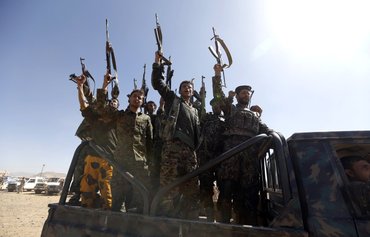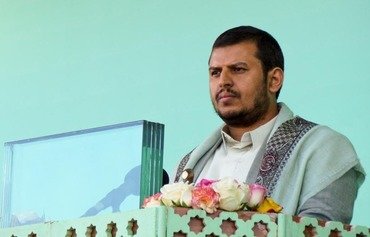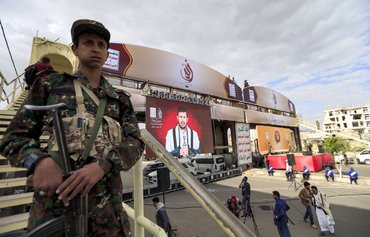The Arab coalition is striking back against a surface-to-air missile defence system recently revealed by the Iran-backed Houthis (Ansarallah), coalition and Yemeni officials said.
Supervising the development of the Houthis' new air defence system is believed to be one of the last activities carried out by Islamic Revolutionary Guard Corps Quds Force commander Qassem Soleimani before his death on January 3rd.
The Houthis confirmed the new air defence system on February 23rd, about a week after attacking an Arab coalition aircraft in al-Jawf province.
The system comprises four surface-to-air missile defence systems: Thaqib 1, Thaqib 2, Thaqib 3 and Fitr 1, according to a Houthi-affiliated media outlet.
Houthi military spokesman Yahya Saree described the downing of the Royal Saudi Air Force Tornado as "a test of a missile of the air defence system".
"This year will be the year of air defence," he boasted.
The Arab coalition said the Houthis' actions were in "violation of the international humanitarian law".
The aircraft "crashed" during an operation to support the Yemeni forces, the coalition said in a February 15th statement carried by the Saudi Press Agency (SPA).
The aircraft's two officers ejected from the plane before it crashed, but then the Houthis opened fire on them, the statement said.
"The Joint Forces Command of the coalition holds the terrorist Houthi militia responsible for the lives and wellbeing of the Tornado air crew under the international humanitarian law," it said.
Destroying military targets
The Arab coalition and international partners are stepping up actions to diminish the Houthis' military capability in light of Iran's smuggling of weapons to the militia.
The coalition on February 23rd carried out airstrikes to destroy Houthi military targets in Sanaa, SPA reported.
The targets included an Iranian-made ballistic missile and drone assembly plant, as well as weapons storage and launching areas in Faj Attan district, al-Amad camp in the Sinhan area (south of Sanaa) and al-Nahdain Mountain.
The Houthis were using these areas to assemble, store and launch ballistic missiles and drones "to target cities and civilians deliberately", said coalition spokesman Col. Turki al-Maliki.
The Joint Forces Command "has undertaken all preventive measures and necessary precautions to protect civilians", he said, noting that the Arab coalition will deal with any threats and hold those behind them to account.
The same day, Arab coalition naval forces thwarted an attack attempted by the Houthis, destroying an explosives-laden boat in the southern Red Sea.
And on February 20th, the coalition intercepted missiles fired by the Houthis from Yemen targeting cities in Saudi Arabia.
System linked to Soleimani
Soleimani's death was "a major turning point" for security in Yemen and the Gulf, according to the Sanaa-based Abaad Studies and Research Centre.
The downing of the Tornado fighter jet confirms "Soleimani's last mission in Yemen was to supervise the delivery of an air defence system to the Houthis", Abaad Centre director Abdusalam Mohammed told Al-Mashareq.
The Houthis' assertion that 2020 is "the year of air defence", he said, is "based on the capabilities provided to them by Iran for this purpose".
This includes the smuggling of parts into Yemen, the development and assembly of the missile system, and training Houthi elements to use the system, he said.
The Houthis have taken advantage of the lull in fighting following UN-sponsored peace talks and of the friction between the Yemeni government and southern separatists "to rearrange their military priorities", he said.
They have been engaged in recruitment, training and armament, he said.
"One of the key priorities was the development of unmanned weapon systems, such as unmanned aerial vehicles (UAVs) and remote-controlled boats, as well as missiles," Mohammed said.
"The Houthis managed to smuggle in a missile system capable of downing coalition aircraft, which an Abaad study revealed one month before the downing of the Saudi military aircraft," he said.
"They also were able to smuggle in anti-armour guided missiles and medium range and ballistic missiles, as revealed by US forces," he said.
Houthis 'an Iranian tool'
Giving the Houthis possession of this system was a strategic goal for Iran "to balance the power between the coalition and the Houthis", Mohammed said.
This illustrates that "Iran is going to impossible lengths to escalate [the conflict] against Saudi Arabia and the UAE through the Houthis in Yemen", he added.
The delivery of game-changing weapons to the Houthis shows this group "has become an Iranian tool that it uses for its own interests in its endeavour to extend its influence in the region", he said.
Iran's interests include bringing an end to the economic blockade imposed on it and resuming its export of oil, he noted.
"Iranian and Hizbullah military advisers are directing the Houthis' military operations in Yemen," political analyst Faisal Ahmed told Al-Mashareq.
Among them is "Abdul Reza Shahlai, who supervised the installation of five air surveillance stations in the provinces of Sanaa, Saada and Amran", he said.
Shahlai's role "was technical in nature, and included training on the set-up of the air defence system and supervision of the training of Houthi elements and the assembly and development of missile parts", he said.
The ultimate goal was the "targeting installations on Saudi territory", he said.

![Yemeni pro-government forces are pictured on the eastern outskirts of al-Hodeidah on November 14th, 2018. [Saleh al-Obeidi/AFP]](/cnmi_am/images/2020/03/03/22751-Yemen-forces-Hodeidah-600_384.jpg)







The Muslim Brotherhood members in al-Islah have left the north to Houthis and started to fight in the south because of oil. As long as the Muslim Brotherhood members are in power, all Yemen will be handed over to the Iran-backed Houthis.
Reply2 Comment(s)
Let them stop their aggression on us and their air strikes and the killing of our children and women, and after that, if one bullet is fired on the evil neighbour of Saudi Arabia, we’ll then be agents of Iran. But for you to kill me and destroy my country day and night and expect me not to defend myself, this is naivety.
Reply2 Comment(s)